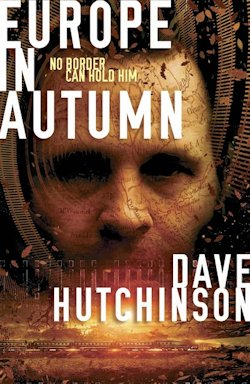Maps are a way of rationalising landscapes, but what kind of map can help us come to terms with a country that changes every day? With a world that defies definition?
Dave Hutchinson’s vision of Europe in the near future is as plausible as it is novel. In the aftermath of catastrophic economic collapse and a flu pandemic which led to the death of many millions, the Union begins to splinter:
The Union had struggled into the twenty-first century and managed to survive in some style for a few more years of bitching and infighting and cronyism. Then it had spontaneously begun to throw off progressively smaller and crazier nation-states, like a sunburned holidaymaker shedding curls of skin.
Nobody really understood why this had happened.
However unclear the reasons may be, “pocket nations” now proliferate across the continent, each with its own borders and orders. Anything goes in some, whilst in others, next to nothing does. With more and more of these micro-countries appearing every year, a gap has opened in the market: there’s a dire demand for people prepared to brave Europe’s impossible topography in order to transport packages—or perhaps important persons—from state to state in spite of tight guidelines.
Some call the organisation which has sprung up to meet the needs of this new niche a company of “glorified postmen.” Others don’t believe in them, even. But they exist, I insist, and they call themselves Coureurs.
No one was sure how many Coureurs were drifting around what used to be Europe. Could have been a hundred, maybe a thousand, maybe ten times that. The nature of their work made them hard to find; popular legend had it that they would find you, arriving at your doorstep on dark night when you needed them most, with their stealth-suits hidden under long black trenchcoats, fedora tilted in best noir fashion to shadow the eyes. This was ludicrous, of course, as anyone could have told you if they really thought about it: anybody who went about dressed like that would deserve to be arrested.
What really happened was a lot less structured and a lot more secretive. Central liked to keep these things vague; even the Coureurs themselves didn’t usually know who had brought them into a Situation. There were tangles of code words and dead drops and mobile pickups and callbox routines, none of which Rudi had yet encountered.
Rudi is a cook in a Krakow restaurant more interested in producing the perfect pierogi than talking politics, but when his manager ask him to help a relative escape the Independent Silesian State of Hindenberg—“formerly the Polish cities of Opole and Wroclaw (formerly the German cities of Opeln and Breslau)”—Rudi becomes embroiled in a secret secondary career as a Coureur.
He “had read his share of spy thrillers, so the situation he found himself in seemed familiar. More than familiar, actually; it smacked of cliché. Cloak and dagger, clandestine meetings on darkened streets in Central Europe. He didn’t feel nervous. Faintly embarrassed, perhaps, but not nervous.” Ridiculous as some of Rudi’s new business is initially, things get serious soon.
His handler Fabio, “the Obi-Wan to [his] Anakin,” goes off book during a training exercise, leaving Rudi to be tortured interminably. Then, after he’s finally freed, a crash signal is communicated to him: a coded message to the effect that he’s to meet with another Coureur immediately. Except the other Coureur is dead. Rudi can be sure about this because he finds his head.
Having published four variously acclaimed collections before he turned twenty-one and moved into journalism, Dave Hutchinson is first and foremost an author of short stories: an episodic ethic he brings to this full-length text too. Hardly a chapter of Europe in Autumn passes that does not introduce a brand new angle on the overarching narrative. These sequences also come complete with new characters, new settings and so on, such that it can be challenging to keep track of what’s happening, far less why.
But there’s a method to this apparent madness. Like Rudi, readers reel from situation to situation feeling increasingly as if the ground beneath our feet is fleeting… which it is. Like Rudi, we become frustrated by a lack of answers to imperative questions. Rest assured that there are answers—these puzzle pieces do enmesh eventually—but in the interim we are as curious as our Coureur. Indeed, we are with him through thick and thin in a way that effectively elevates the stakes.
A clever trick, this, however Hutchinson does run the risk of repelling the less dedicated, because like Rudi, we too are almost always lost, and whilst he has no other option but to forge on, we indubitably do. I’m afraid the fact that everything comes together to tremendous effect during the conclusion will be of little consolation to readers who haven’t the patience to play the waiting game.
That’d be a great shame. Europe in Autumn is not an easy novel to read, no, but this awesome concoction of sci-fi and spies—picture John le Carré meets Christopher Priest—is an early favourite of the year for me, and I beg you approach it with the willingness to be baffled and briefly defeated it needs to succeed.
Europe in Autumn is available now from Solaris.
Niall Alexander is an extra-curricular English teacher who reads and writes about all things weird and wonderful for The Speculative Scotsman, Strange Horizons, and Tor.com. He’s been known to tweet, twoo.










